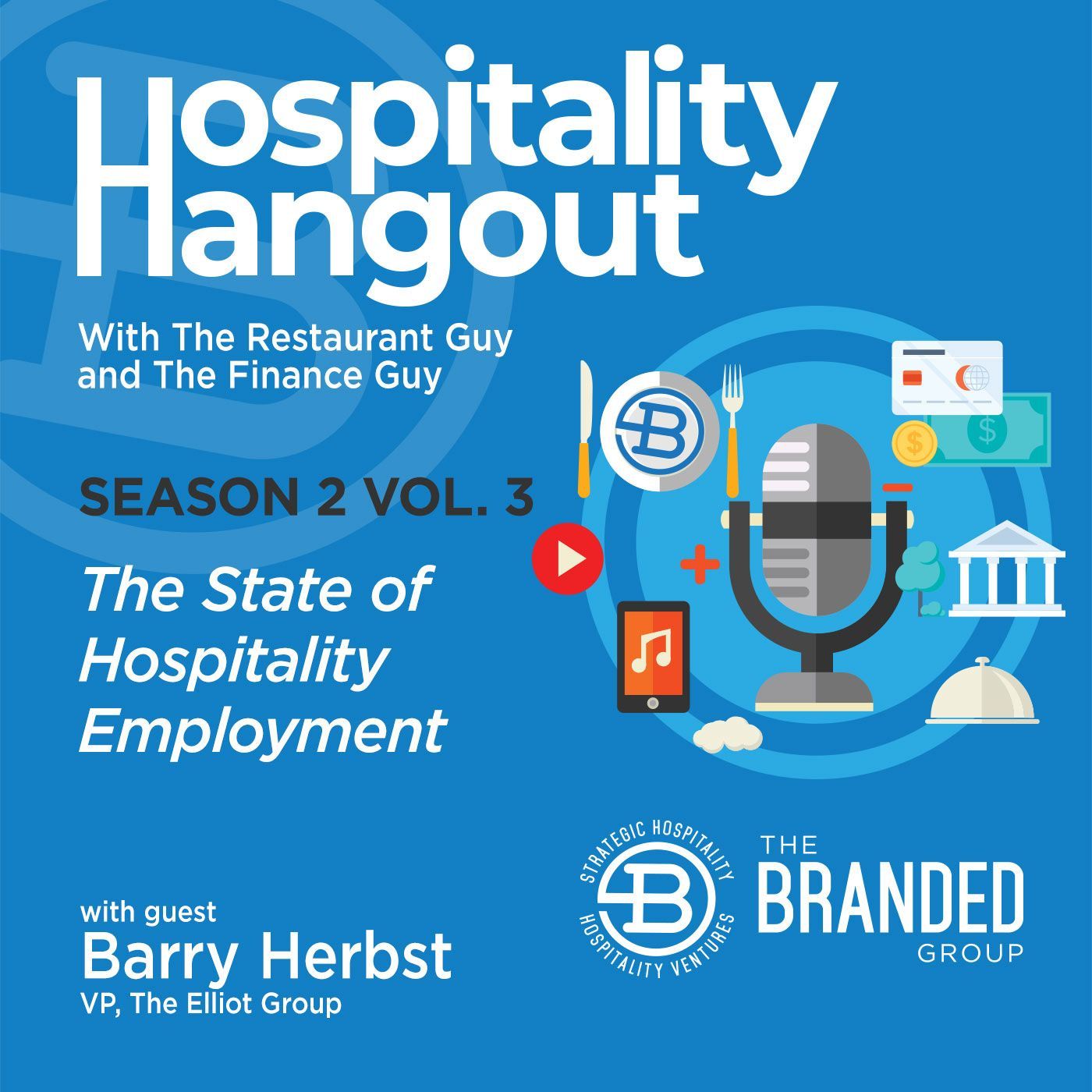The Elliot Group's Perspective on Hospitality Hiring Trends

Welcome to the blog! In this post, we'll be diving deep into the current hiring trends within the hospitality sector, offering a comprehensive analysis from the expert perspective of The Elliot Group. The hospitality industry is dynamic, constantly evolving, and currently facing unique challenges in attracting and retaining talent. To help unpack these complexities and offer practical advice, we'll explore everything from executive hiring to the impact of these trends on overall business operations. Be sure to check out the related podcast episode of the Hospitality Hangout, The State of Hospitality Employment | Season 2, Vol. 3: The Elliot Group, where Michael Schatzberg and Jimmy Frischling interview Barry Herbst, Vice President of The Elliot Group, for even more in-depth insights. Now, let’s get started!
Current Hiring Trends in Hospitality: An Overview
The hospitality industry is experiencing a period of significant transformation in its hiring practices. Several key trends are shaping the current landscape, impacting both employers and job seekers. Understanding these trends is crucial for navigating the complexities of the modern hospitality workforce.
Firstly, there's a noticeable shift towards prioritizing employee well-being and work-life balance. The long hours and demanding nature of hospitality work have traditionally contributed to high turnover rates. Now, companies are beginning to recognize the importance of creating a more supportive and flexible environment. This includes offering benefits such as mental health support, flexible scheduling, and opportunities for professional development.
Secondly, technology is playing an increasingly important role in recruitment and talent management. Online job boards, social media platforms, and applicant tracking systems (ATS) are becoming essential tools for sourcing candidates. Moreover, technology is also transforming the way hospitality businesses operate, leading to a demand for employees with tech-related skills, such as data analysis, digital marketing, and IT support.
Thirdly, there is a growing emphasis on diversity, equity, and inclusion (DEI) initiatives. Hospitality businesses are recognizing the value of creating a diverse workforce that reflects the communities they serve. This involves implementing inclusive hiring practices, providing DEI training for employees, and fostering a culture of belonging.
Finally, the rise of the gig economy and alternative work arrangements is also influencing the hospitality sector. Many individuals are seeking freelance or contract-based positions, offering flexibility and autonomy. This presents both opportunities and challenges for hospitality businesses, requiring them to adapt their hiring strategies and compensation models.
The Elliot Group's Perspective on Executive Hiring
The Elliot Group, a leading executive search firm specializing in the hospitality industry, offers a unique perspective on hiring trends, particularly at the executive level. Their expertise in placing top-tier talent provides valuable insights into the skills, qualifications, and qualities that hospitality businesses are seeking in their leaders.
According to The Elliot Group, there is a growing demand for executives with strong leadership skills, strategic thinking abilities, and a proven track record of driving growth and innovation. In today's competitive market, hospitality businesses need leaders who can adapt to change, make data-driven decisions, and inspire their teams.
Furthermore, The Elliot Group emphasizes the importance of cultural fit when hiring executives. They believe that successful leaders are those who align with the company's values, mission, and culture. This requires a thorough understanding of the company's culture and a careful assessment of the candidate's personality, work style, and values.
The Elliot Group also highlights the increasing importance of digital literacy and technological expertise in executive roles. As hospitality businesses become more reliant on technology, executives need to be comfortable with data analysis, digital marketing, and other tech-related tools. They also need to be able to lead digital transformation initiatives and foster a culture of innovation.
Finally, The Elliot Group notes that executive compensation packages are becoming more competitive, reflecting the high demand for top-tier talent. In addition to base salary, companies are offering attractive benefits packages, including stock options, performance-based bonuses, and comprehensive healthcare coverage. These packages are designed to attract and retain the best and brightest in the industry.
Key Challenges in Retaining Top Hospitality Talent
Attracting top talent is only half the battle; retaining them is equally important. The hospitality industry faces unique challenges in retaining its workforce, particularly in a competitive job market. Understanding these challenges is essential for developing effective retention strategies.
One of the primary challenges is the demanding nature of hospitality work. Long hours, high stress levels, and limited work-life balance can lead to burnout and dissatisfaction. This is especially true for frontline employees who interact directly with customers and bear the brunt of service-related pressures.
Another challenge is the perception of limited career advancement opportunities. Many hospitality employees feel that there is a lack of clear pathways for growth and development within their organizations. This can lead to a sense of stagnation and a desire to seek opportunities elsewhere.
Compensation and benefits are also critical factors in retention. While the hospitality industry has traditionally offered lower wages compared to other sectors, there is a growing recognition of the need to offer competitive salaries and benefits packages. This includes healthcare, retirement plans, paid time off, and other perks that enhance employee well-being.
Furthermore, the lack of recognition and appreciation can contribute to employee turnover. Many hospitality employees feel that their contributions are not adequately valued or acknowledged. This can lead to feelings of resentment and a lack of motivation.
Finally, a negative work environment can be a significant deterrent to retention. Factors such as poor management, lack of communication, and workplace conflict can create a toxic atmosphere that drives employees away.
Impact of Hiring Trends on Hospitality Businesses
The current hiring trends in the hospitality sector have a profound impact on businesses of all sizes. Understanding these impacts is crucial for making informed decisions about hiring, training, and employee management.
One of the most significant impacts is the increased cost of recruitment and retention. As the demand for talent rises, companies are forced to spend more on advertising, recruitment agencies, and employee benefits. High turnover rates also lead to additional costs associated with training new employees and filling vacant positions.
Another impact is the need for greater flexibility and adaptability. Hospitality businesses must be willing to adapt their hiring practices, compensation models, and work environments to meet the changing needs and expectations of the workforce. This may involve offering flexible schedules, remote work options, and alternative career paths.
The hiring trends also necessitate a greater focus on employee training and development. As technology transforms the hospitality industry, employees need to acquire new skills and knowledge to remain competitive. This requires investing in training programs that cover topics such as data analysis, digital marketing, and customer service.
Furthermore, the emphasis on DEI initiatives requires hospitality businesses to create inclusive hiring practices and foster a culture of belonging. This involves conducting diversity audits, implementing DEI training programs, and establishing employee resource groups.
Finally, the hiring trends are forcing hospitality businesses to re-evaluate their employer branding strategies. Companies need to showcase their values, culture, and employee benefits to attract top talent. This involves creating compelling job descriptions, highlighting employee success stories, and promoting a positive work environment.
Strategies for Navigating the Evolving Employment Landscape
Navigating the evolving employment landscape in the hospitality sector requires a proactive and strategic approach. Here are some effective strategies for businesses to consider:
Firstly, invest in employee well-being. Prioritize initiatives that promote work-life balance, mental health support, and stress management. This can include offering flexible schedules, providing access to counseling services, and creating a supportive work environment.
Secondly, develop clear career pathways. Provide employees with opportunities for growth and development within the organization. This can include offering training programs, mentorship opportunities, and promotion tracks.
Thirdly, offer competitive compensation and benefits. Conduct market research to ensure that your salaries and benefits packages are competitive with industry standards. Consider offering additional perks, such as performance-based bonuses, stock options, and comprehensive healthcare coverage.
Fourthly, recognize and appreciate employee contributions. Implement a system for recognizing and rewarding employees who go above and beyond. This can include employee-of-the-month awards, team celebrations, and public acknowledgements.
Fifthly, foster a positive work environment. Promote open communication, teamwork, and respect. Address workplace conflict promptly and fairly. Create a culture of trust and collaboration.
Sixthly, embrace technology. Leverage technology to streamline recruitment processes, enhance employee training, and improve communication. Use online job boards, social media platforms, and applicant tracking systems to attract candidates. Implement learning management systems to deliver training programs.
Seventhly, prioritize DEI initiatives. Implement inclusive hiring practices, provide DEI training for employees, and foster a culture of belonging. Create employee resource groups to support diverse employee populations.
Eighth, strengthen your employer brand. Showcase your values, culture, and employee benefits to attract top talent. Create compelling job descriptions, highlight employee success stories, and promote a positive work environment.
Advice from The Elliot Group for Employers
Drawing on their extensive experience in the hospitality executive search field, The Elliot Group offers valuable advice for employers seeking to navigate the current hiring landscape:
Understand your company culture: Before you start hiring, take the time to understand your company's values, mission, and culture. This will help you identify candidates who are a good fit for your organization.
Define clear job requirements: Create detailed job descriptions that clearly outline the skills, qualifications, and responsibilities required for each position. This will help you attract candidates who are well-suited for the role.
Be flexible and adaptable: Be willing to adapt your hiring practices, compensation models, and work environments to meet the changing needs and expectations of the workforce. This may involve offering flexible schedules, remote work options, and alternative career paths.
Invest in employee development: Provide employees with opportunities for growth and development within the organization. This can include offering training programs, mentorship opportunities, and promotion tracks.
Prioritize employee well-being: Focus on initiatives that promote work-life balance, mental health support, and stress management. This can help you attract and retain top talent.
Build strong relationships with recruiters: Partner with reputable executive search firms, like The Elliot Group, to tap into their network of qualified candidates and gain valuable insights into the hiring landscape.
Communicate effectively: Keep candidates informed throughout the hiring process. Provide timely feedback and updates. Be transparent about your company's values, culture, and expectations.
Be prepared to negotiate: Be willing to negotiate salary and benefits packages to attract top talent. Understand the market value of different skills and qualifications.
Conclusion: Adapting to the Future of Hospitality Hiring
The hospitality industry is undergoing a significant transformation in its hiring practices. By understanding the current trends, challenges, and strategies, hospitality businesses can adapt to the evolving employment landscape and attract and retain top talent. The insights shared by The Elliot Group provide valuable guidance for navigating these complexities and building a successful workforce for the future. By focusing on employee well-being, investing in training and development, and fostering a positive work environment, hospitality businesses can create a competitive advantage in the talent market. Be sure to listen to The State of Hospitality Employment | Season 2, Vol. 3: The Elliot Group episode of the Hospitality Hangout for further discussion on this topic! Thanks for reading.






